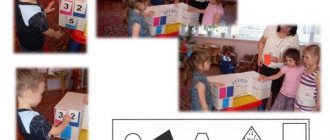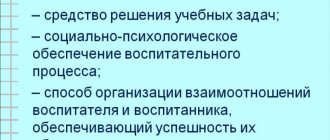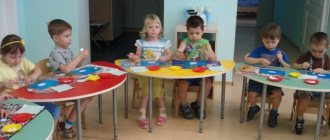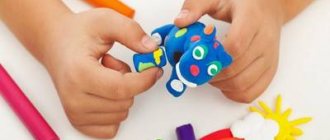Ways to involve children in different activities
Educators often face a problem when a child refuses any type of activity (art, music, joint play, etc.). For example, he does not want to do something together with others, preferring to play alone with his favorite toy. In such situations, various variations in the behavior of an adult are possible.
For example, a teacher insists that a child stop playing with a toy and switch to another activity, doing the same thing as other children. At the same time, the adult seems to have good intentions and wants the child to acquire new knowledge, skills and abilities. However, by insisting on his demand, he suppresses the child’s initiative. Activities in which a child participates at the direction of an adult often turn out to be uninteresting for him - he participates in it only formally. This leads to a person’s passive position, which can be expressed as follows: “An adult always knows better what to do.
Let's consider another option. The teacher always allows the child to do what he likes best and never encourages him to participate in other activities. At first glance, this attitude looks like a manifestation of an individual approach to education. However, a truly individual approach requires creating conditions that allow each person to develop most effectively. A situation where a teacher “leave” a child alone can be used as a temporary measure. The effectiveness of an individual approach to raising a child can be analyzed using the following example.
Every day Olga plays with only one toy - a teddy bear. So, she reproduces the same action (rolling him in a trolley), does not want to be busy with something else, and avoids communicating with peers. In this case, the teacher should try to expand the child’s range of interests, encourage him to engage in new activities, and play with other children.
For example, an adult can invite Olya to build a house for a bear cub, make clay pies, or draw a picture. To involve a girl in playing together with her peers, you can offer to organize a birthday party for the bear cub and invite children. At the "party" they will dance, sing, play outdoor games, etc.
Thus, using gaming techniques, the teacher can involve the child in various types of activities, during which he will learn elementary methods of forming, drawing, constructing, and gain experience communicating with peers. Discussion as a means of resolving conflict situations. The need to correct the actions and behavior of children often arises in various conflict situations, when just a remark is not enough, but its solution should not lead to a new conflict; Children should not forcibly distance themselves from each other, accompanying their actions with reprimands and threats. Violence and aggression beget mutual violence and aggression. An effective way in this case is to discuss with children the problem that may arise either between children or between a child and an adult. The adult helps identify the problem, suggest the best solution, evaluate the result and praise the children for a successful solution.
Implementation of a person-centered approach in the practice of education
Personally-oriented pedagogy means for a teacher not only the creation of a favorable atmosphere, but also a constant appeal to the subjective experience of the student as the experience of his own life activity. The main goal of person-centered education is to reveal the content of each child’s subjective experience, bring it into line with the current tasks of educational work, and on this basis initiate the process of self-education of the child.
How is this approach implemented in the specific conditions of the pedagogical process? The teacher pays special attention to the integration of each student's unique and inimitable subjective experience with real-life activities. The correlation of socially significant and personally significant individual experience occurs in the interaction of the teacher and the child on the basis of balanced initiatives of the adult and the child as equal partners.
The implementation of person-centered education requires the teacher to comply with the following requirements:
- use a variety of methods, techniques, forms, ways of revealing the subjective experience of students, identifying their character traits, tastes, and views;
- rely as much as possible on independent activity, that is, not so much to direct as to organize and direct the activities of children
- involve children in independent or joint setting of educational goals, planning activities
- Encourage children to independently choose and practice socially acceptable behaviors.
- create situations of pedagogical communication in which each student can show initiative, independence and selective behavior
- Provide opportunities for students to express themselves naturally;
- encourage students to express themselves, analyze the motives and methods of their own behavior and the behavior of other students, and make value judgments at the appropriate age level;
- strive to encourage and evaluate not only actions, but also needs, motives, methods of activity, direction of activity and degree of independence.
- involve each child in a discussion of the goals and results of learning, successful steps, reasons for successes and failures, attitude towards the activity (what you wanted to repeat and what you wanted to do differently).
Understanding a child means penetrating into his inner spiritual world. Understanding is based on diagnosing the child’s personality and studying his experience and consists in the fact that the teacher creates on this basis a holistic picture of the child’s personality. Recognition of a child means the child’s right to be himself, the child’s right to respect from an adult. Recognition of a child means that the teacher maintains a balance between the child’s freedom of action, thinking and goal-setting and the reasonable demands placed on him by the teacher and society.
Acceptance of a child is a positive attitude towards him without any conditions on the part of parents and teachers. Accepting a child does not mean abandoning educational requirements, but presupposes such an attitude towards educational tasks and the choice of educational technology that best ensures the development of this particular child.
Preparing teachers to design student-centered interactions with students
The current stage of development of Russian society is clearly reflected in all transformations of the education system, which are currently irreversible and are characterized by a change in pedagogical paradigms and updating of content. Modern educational concepts are becoming more and more clearly personal. This is reflected in the innovative ideas of humanization and humanitarization, focus on the development of the student’s personality, on creating opportunities for the student to take not just an active, but also a subjective position in the educational process, not just “learn” the material offered by the teacher (program, textbook), but explore the world by entering into an active dialogue with it, look for answers yourself, identifying and developing your unique capabilities, forming an individuality. Thus, schools and other educational institutions have an urgent need for a teacher who is capable of raising hardworking, moral, enterprising people who can quickly adapt to changing living conditions, who are capable of independently choosing a field of activity, making responsible decisions based on what they have learned and accepted as regulators of their own life activity of the system of universal human values, the foundations of world, regional and national culture. Probably, first of all, he himself must possess such qualities.
The emergence of a new education system requires a radical rethinking of the existing approach to teacher training. In the “Concept of modernization of Russian education for the period up to 2010.” a qualitatively new level of teacher training in vocational education institutions is being determined. Its most important task is to radically improve the system of vocational education and “training a qualified worker of the appropriate level and profile, competitive in the labor market, competent, responsible, fluent in his profession and oriented in related fields of activity, capable of effective work in his specialty at the level of world standards” .
The process of development of a person’s personality in adolescence is characterized by two opposing trends: on the one hand, there is an increase in independence, the formation of personal properties, and a complication of the inner world, and on the other hand, the orientation towards the group intensifies, and ever closer inter-individual connections are established. One of the most important moments in a teenager’s personality is the development of self-awareness, self-esteem; adolescents develop an interest in themselves, in the qualities of their personality, a need to evaluate themselves, to understand their feelings and experiences.
Self-esteem is formed under the influence of other people’s assessments, comparison of oneself with others; the most important role in the formation of self-esteem is played by the success of activities. Self-esteem includes moral manifestations, attitude towards others, and one’s own capabilities. Having positive self-esteem and self-respect is a necessary condition for normal personality development. The discrepancy between a teenager’s self-esteem and his aspirations leads to acute experiences, exaggerated and inadequate reactions, displays of touchiness, aggressiveness, distrust, and stubbornness.
An analysis of the existing practice of teacher training at pedagogical universities and educational institutions of secondary vocational education shows that it is carried out on the basis of a personality-oriented approach, which contributes to the development of pedagogical thinking among teachers in personality-oriented pedagogical activities, which includes: awareness of the specifics of this activity related to the creation of personality teachers; awareness of oneself in this activity as a bearer of spiritual conflicts of one’s pupil; promoting his formation as a unique personality and main value; his understanding of the pedagogical process as the search and implementation of a personally oriented situation, the effectiveness of which depends on the ability of its subjects to interact, dialogical activity.
However, upon closer examination of the materials, it is discovered that the teacher is preparing to teach a special subject based on the traditional “knowledge-based” model of education.
Thus, the nature of teacher training has led to the emergence of a fundamental contradiction between the system of teacher professional training based on personality-oriented education, the development of the individual-creative nature of his work and his unwillingness to implement them in his future teaching activities.
There is also a contradiction between the need to modernize the learning process in the context of personal orientation and the insufficient development of pedagogical technology that allows for the implementation of this new content. Numerous studies on the problems of pedagogical technologies, which have been carried out by scientists only over the last decade, are mainly devoted to school technologies, but there are almost no technological developments focused on the pedagogical training of the teacher himself.
The development of professional thinking of a manager in the system of additional professional education should be carried out using problem-based learning methods, the positive aspects of which are: activation of the developmental potential of learning, independent search activity, high cognitive level, subject-subject relationships, personal involvement of all participants in the learning process, its practical direction. With this approach, what becomes decisive is not the mass of the base, but its flexibility, not the amount of information, but the ability to create new shoots based on basic knowledge.”
Modern pedagogy is going through a period of rethinking approaches, abandoning established traditions and stereotypes of training future specialists in the pedagogical field of activity. The desire to optimize the educational process led to the emergence of new and improved pedagogical technologies, the subsequent development of which is associated with the implementation of the modern concept of education and professional training. An essential feature of modern innovation processes in the educational sphere is their pedagogical technology - compliance with the sequence of stages of innovation implementation. Mastery of innovative technologies is becoming a general and priority need of the specialist training market, determining the formation of professional skills and necessary qualities of future teachers, such as a creative approach to organizing professional activities, a systemic vision, and a focus on success. Among the technologies that are actively used in pedagogical theory and practice, traditional and innovative ones can be distinguished. Their comparative analysis allows us to highlight both positive and negative aspects.
The advantages of traditional technologies include: scientific nature (there cannot be erroneous knowledge, there can only be incomplete knowledge); organizational clarity of the pedagogical process, constant ideological and emotional influence of the teacher’s personality; optimal expenditure of resources during mass training; ordered, logically structured presentation of educational material, focus on memory development (memorization and reproduction); availability; taking into account the age and individual characteristics of students; awareness of tasks and activity. The use of technologies for the formation of a creative personality gives students the opportunity to independently and actively master their future professional activities. The main task of training is to create an atmosphere of creativity, to reveal the capabilities of everyone, to search for modern forms and methods of educational and cognitive activity.
One of the most pressing problems in the transition of the modern education system to the personal paradigm is the subjectification of the pedagogical process, the transmission of personal humanistic values from the teacher to the student. This is possible only under the condition of productive organization of pedagogical interaction, namely its design. Pedagogical interaction as the direct or indirect influence of people on each other is the basis and condition for establishing a wide variety of connections between subjects of education, including both casual and cause-and-effect. In this regard, it is the leading factor that determines the personal development of the student. Designing interaction with a student allows you to update the personal experience of students, develop personal functions of both students and teachers, and promote the personal growth of all subjects of interaction. Thus, interaction is the space, the plane in which the personal development of participants in the pedagogical process occurs.
Analysis of empirical data obtained by researchers in recent years shows that in mass pedagogical practice the formal nature of interaction is steadily preserved: 83.3% of teachers interact on the basis of subject-object relations. Thus, training in the design of person-oriented interaction should be included in the educational program of pedagogical educational institutions.
In studies of teachers, psychologists and in the analysis of mass practice, shortcomings in the training of teachers are still noted, including:
‒ orientation, mainly, to the traditional methodological system, based on the reproductive nature of teachers’ assimilation of knowledge, skills, abilities;
- insignificant variability in the independent search for solutions to pedagogical problems; insufficient focus on the individual, his motivational sphere;
‒ the formal nature of calls for a humane approach to the child and the low level of pedagogical interaction between teachers and students, which does not ensure the development of a humane pedagogical position of the teacher.
The nature of interaction between teachers and students in the educational process often remains traditional. As before, students are rarely involved in building their own educational path, and the forms of their interaction with teachers remain frontal and not personally oriented. This forces scientists to return again to the issues of teaching effectiveness at a new stage in the development of pedagogical science.
In modern pedagogical research, the task of organizing such a pedagogical process in which each of the students could become the subject of their own development, be in search and build those types of active relationship to the world in which the uniqueness of a particular individual can most fully manifest itself and develop, comes to the fore.
Literature:
- Volkov B. S., Volkova N. V. Developmental psychology. Textbook for universities - M., “Vlados”, 2005.
- Fedoseeva A. E. Peculiarities of self-esteem of the personality of senior schoolchildren. “Innovations in technology and education.” VI International Scientific and Practical Conference. Collection of articles. - Belovo, 2013.
- Eroshin V.I. Development of a system of additional professional education for heads of educational institutions. dis. Dr. ped. Sci. - Moscow, 2003. 215 p.
- Podmazin S.I. Personality-oriented education. Social and philosophical research. - Zaporozhye: Prosvita, 2000. - 250 p.








